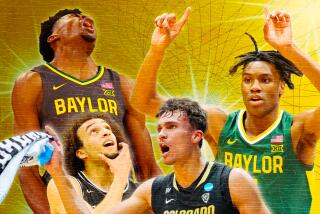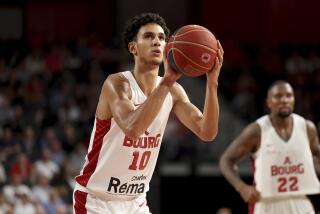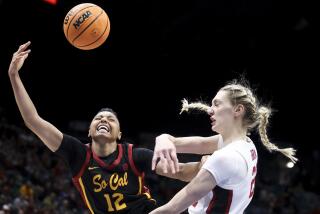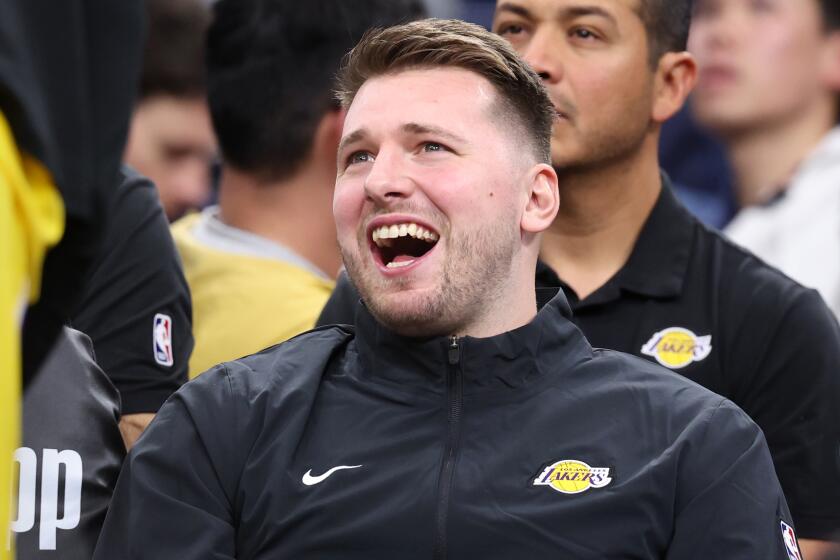Hazy Forecast
- Share via
Two seasons into his NBA career, such as that disjointed initiation of 1998-99 was, Toby Bailey has gone from second-round pick from UCLA to staring at stardom.
Of course, that’s only in practice, where he goes against Penny Hardaway. Otherwise, he waits. For injuries, for a chance.
Or maybe just for the future.
Bailey is a Phoenix Sun until the end of the season--a timeline that will expire as soon as Sunday at America West Arena if the Lakers sweep the Western Conference semifinals--and then a free agent. He likes both Phoenix and the Suns, and they like him, albeit more for a positive attitude than on-court contributions these days. But he also likes the idea of maybe, oh, getting into a game.
That hasn’t happened much. Bailey played the final 4 minutes 25 seconds Sunday in the series opener, getting in when the Suns trailed by 21 points, and didn’t get off the bench in the Lakers’ one-point win Wednesday. He played two minutes--two appearances of one minute each--in the first round against the San Antonio Spurs. He averaged only 9.8 minutes in 46 regular-season appearances.
“If I didn’t see light at the end of the tunnel, I’d be upset,” he said. “But I know I’m just paying my dues right now. It’s just a matter of time.”
Phoenix was a great destination after UCLA--the hometown Lakers picked him 45th in 1998 and immediately shipped him to Arizona in a prearranged deal for future considerations--because the Suns’ open-court style was an ideal match for Bailey’s athleticism. Plus, there were former NBA guards all over the coaching staff--Danny Ainge, Scott Skiles, Frank Johnson--all the better for his development while playing both backcourt spots. The right place.
The wrong time. Playing in the summer league before his rookie season would have been beneficial, but NBA teams could not field squads because of the lockout. Nor did he go through a normal training camp. What was left, after the labor dispute was settled, was a fire drill of a preseason camp, offering a fraction of the instruction he normally would have received. The rush to squeeze 50 games into a shortened schedule also meant far fewer practices than normal during the regular season.
Still, Bailey started 10 times, the most by a Sun rookie in three years. He averaged 3.4 points, 3.2 rebounds and 14.6 minutes in those games . . . but made only 17 other appearances and finished at 9.2 minutes overall, end-of-the-bench numbers. It was a strange season in every way.
He’d get his chance in his second season, he thought. A good summer program, a full training camp and that crazy 1998-99 would be a ghost. Then the Suns traded for Hardaway and, well, there went those plans.
On a team that now had two big guards--6-foot-4 Jason Kidd at the point and 6-7 Hardaway at shooting guard--Bailey, at 6-6, was a big guard. Bailey had speed, but the starting backcourt could also motor. They were stars. He was starting out.
Hardaway’s foot injury--he sat out a 21-game stretch from late December to late January--brought opportunities for Bailey: 32 minutes against the Golden State Warriors, 27 against the Denver Nuggets, 21 against the Vancouver Grizzlies. But Hardaway returned just as Bailey was beginning to feel comfortable and Kevin Johnson was signed out of retirement to bolster the backcourt. So the next thing Bailey knew, his patience was again being tested far more than his jumper--which might not have been such a bad thing, since he made only 39.5% and 41.4% of his shots the first two seasons. In all, he averaged 9.8 minutes in 46 games, then got to poke his head in the door of a few playoff games.
“We’ve got guys like Jason Kidd, he’s an Olympian, and Penny, one of the best players in the league,” Bailey said. “Todd Day has been in the league eight or 10 years and can shoot the lights out. KJ, he’s a legend. So it’s not that hard to rationalize.
“Last year, there were a lot of times when I didn’t play much and I didn’t have that confidence you need. I would think, ‘Man, if I had to go in right now, I don’t know if I’d help the team.’ This year, because of the practicing and just being in my second season, at least I know what I could do.”
Only the chance to prove it is missing. Barring a miracle, Bailey won’t be getting it in these playoffs. Barring a surprise--namely injuries--the chance to become anything more than the third guard won’t come next season in Phoenix, either. That leaves leaving.
“It’s definitely an option,” said Bailey, a star of UCLA’s 1995 national championship team as a freshman and a three-time All-Pacific 10 Conference selection. “But I love this organization and I always wanted it that, if I was going to leave this organization, it would be after a good year. I don’t want to leave after not playing.”
Hardaway and Kidd will be back. Rex Chapman, sidelined since March after undergoing an appendectomy and not on the playoff roster, has four years left on his contract. Day, who was getting big minutes late in the regular season before all but vanishing in the playoffs, is a free agent. Johnson has said he plans to retire again.
The question of where Bailey fits in is not easily answered. Chapman’s shaky status and Day’s contract situation could mean a lack of depth at shooting guard behind Hardaway. But even Bailey doesn’t know what kind of commitment the Suns are prepared to make in the summer.
He must wait to find out. And, in the meantime, watch.
(BEGIN TEXT OF INFOBOX / INFOGRAPHIC)
Not Exactly an Honor Roll
Since 1986, UCLA’s storied basketball program has sent a shooting star to the NBA in Reggie Miller but mostly stocked benches around the league with the 18 other players who were drafted or signed as free agents:
Year: 1999
Player: Baron Davis
Po.: G
Cl.: So.
Where Selected: 1st round (3rd overall)
Drafted by or 1st Team: Charlotte
Nba Seasons and Statistical Averages for Career or Final Season: 1st season (18.6 minutes, 5.9 points)
Comment: Frankly, Charlotte doesn’t give a damn about Davis or he would start
ahead of David Wesley.
*
Year: 1998
Player: Jelani McCoy
Po.: C
Cl.: Jr.
Where Selected: 2nd round (33rd overall)
Drafted by or 1st Team: Seattle
Nba Seasons and Statistical Averages for Career or Final Season: 2nd season (12.8 minutes, 4.5 points)
Comment: The “Reel” McCoy should have made himself available only for NBA
slam-dunk contest.
*
Year: 1998
Player: Toby Bailey
Po.: G
Cl.: Sr.
Where Selected: 2nd round (45th overall)
Drafted by or 1st Team: Phoenix
Nba Seasons and Statistical Averages for Career or Final Season: 2nd season (9.8 minutes, 3.5 points)
Comment: The Gorilla gets more floor time in Phoenix than Bailey.
*
Year: 1998
Player: J.R. Henderson
Po.: F
Cl.: Sr.
Where Selected: 2nd round (56th overall)
Drafted by or 1st Team: Vancouver
Nba Seasons and Statistical Averages for Career or Final Season: 1 season (11 minutes, 3.2 points in 1999)
Comment: Not a question of “Who Shot J.R.?” Rather “Did J.R. Ever Have a Shot?”
*
Year: 1997
Player: Charles O’Bannon
Po.: G
Cl.: Sr.
Where Selected: 2nd round (32rd overall)
Drafted by or 1st Team: Detroit
Nba Seasons and Statistical Averages for Career or Final Season: 3 seasons (9.2 minutes, 3.1 points in 1999)
Comment: Charles wasn’t as much of a zer-O’ in the NBA as brother Ed.
*
Year: 1995
Player: Ed O’Bannon
Po.: F
Cl.: Sr.
Where Selected: 1st round (9th overall)
Drafted by or 1st Team: New Jersey
Nba Seasons and Statistical Averages for Career or Final Season: 3 seasons (12.6 minutes, 3.2 points in 1997-98)
Comment: Ed O’ faded from the scene about as quickly as the Cabbage Patch Kid doll craze.
*
Year: 1995
Player: George Zidek
Po.: C
Cl.: Sr.
Where Selected: 1st round (22nd overall)
Drafted by or 1st Team: Charlotte
Nba Seasons and Statistical Averages for Career or Final Season: 3 seasons (5.3 minutes, 2.4 points in 1997-98)
Comment: In the NBA landscape, Zidek was merely a tree trunk.
*
Year: 1995
Player: Tyus Edney
Po.: G
Cl.: Sr.
Where Selected: 2nd round (47th overall)
Drafted by or 1st Team: Sacramento
Nba Seasons and Statistical Averages for Career or Final Season: 3 seasons (12 minutes, 5.3 points in 1997-98)
Comment: Edney’s NBA career seemed to last as long as his coast-to-coast drive aainst Missouri.
*
Year: 1993
Player: Richard Petruska
Po.: F
Cl.: Sr.
Where Selected: 2nd round (46th overall)
Drafted by or 1st Team: Houston
Nba Seasons and Statistical Averages for Career or Final Season: 1 season (4.3 minutes, 2.4 points in 1993-94)
Comment: Petruska probably better suited for an exercise video than suiting up in the NBA.
*
Year: 1993
Player: Mitchell Butler
Po.: G
Cl.: Sr.
Where Selected: Not drafted
Drafted by or 1st Team: Washington
Nba Seasons and Statistical Averages for Career or Final Season: 6 seasons (13.5 minutes, 5.4 points in 1999)
Comment: Good enough in the NBA to get a few “The Butler Did It” headlines.
*
Year: 1992
Player: Tracy Murray
Po.: F
Cl.: Jr.
Where Selected: 1st round (18th overall)
Drafted by or 1st Team: San Antonio*
Nba Seasons and Statistical Averages for Career or Final Season: 8th season (20.4 minutes, 10.2 points in career)
Comment: Murray didn’t play for the Wizard at UCLA, but seems to be in Wizards’long-range plans.
*
Year: 1992
Player: Don MacLean
Po.: F
Cl.: Sr.
Where Selected: 1st round (19th overall)
Drafted by or 1st Team: Detroit*
Nba Seasons and Statistical Averages for Career or Final Season: 8th season (20.1 minutes, 11.1 points in career)
Comment: MacLean has been passed around the NBA more than the Red Violin.
*
Year: 1992
Player: Gerald Madkins
Po.: G
Cl.: Sr.
Where Selected: Not drafted
Drafted by or 1st Team: Cleveland
Nba Seasons and Statistical Averages for Career or Final Season: 3 seasons (12.8 minutes, 1.9 points in 1997-98)
Comment: It’s believed that Madkins was one of the forefathers of the 10-day NBA contract.
*
Year: 1992
Player: Darrick Martin
Po.: G
Cl.: Sr.
Where Selected: Not drafted
Drafted by or 1st Team: Minnesota*
Nba Seasons and Statistical Averages for Career or Final Season: 6th season (21.6 minutes, 8.5 points in career)
Comment: Martin has played with four NBA teams but will forever be branded a Clipper.
*
Year: 1990
Player: Trevor Wilson
Po.: F
Cl.: Sr.
Where Selected: 2nd round (36th overall)
Drafted by or 1st Team: Atlanta
Nba Seasons and Statistical Averages for Career or Final Season: 5 seasons (13.2 minutes, 3.2 points in 1995-96)
Comment: Wilson put up more zeros in NBA than major league-pitching namesake.
*
Year: 1989
Player: Pooh Richardson
Po.: G
Cl.: Sr.
Where Selected: 1st round (10th overall)
Drafted by or 1st Team: Minnesota
Nba Seasons and Statistical Averages for Career or Final Season: 10 seasons (30.4 minutes, 11.1 points in career)
Comment: Pooh was raised by Timberwolves in the NBA before going out with Clippers.
*
Year: 1987
Player: Reggie Miller
Po.: G
Cl.: Sr.
Where Selected: 1st round (11th overall)
Drafted by or 1st Team: Indiana
Nba Seasons and Statistical Averages for Career or Final Season: 13th season (34.6 minutes, 19.5 points in career)
Comment: Shame on those who once said that sister Cheryl had more game than Reggie did.
*
Year: 1987
Player: Jack Haley
Po.: C
Cl.: Sr.
Where Selected: 4th round (79th overall)
Drafted by or 1st Team: Drafted Chicago
Nba Seasons and Statistical Averages for Career or Final Season: 10 seasons (3.2 minutes, 1.4 points in 1997-98)
Comment: Once every 76 years, a player such as Haley comes around.
*
Year: 1987
Player: Montel Hatcher
Po.: G
Cl.: Sr.
Where Selected: 7th round (149th overall)
Drafted by or 1st Team: Minnesota
Nba Seasons and Statistical Averages for Career or Final Season: Never played in NBA
Comment: Montel should have pursued daytime TV talk-show gig rather than pro basketball.
*
* Murray was with Washington, MacLean with Phoenix and Martin with Sacramento in 1999-2000.
--Research and comments by JIM RHODE










